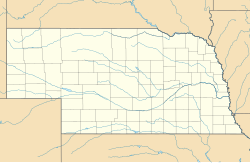McCook Army Airfield
| McCook Army Airfield | |||||||||||||||||||
|---|---|---|---|---|---|---|---|---|---|---|---|---|---|---|---|---|---|---|---|

2006 USGS Orthophoto
|
|||||||||||||||||||
| Summary | |||||||||||||||||||
| Airport type | Military | ||||||||||||||||||
| Owner | USAAF | ||||||||||||||||||
| Location |
Red Willow County, near McCook, Nebraska |
||||||||||||||||||
| Coordinates | 40°18′25″N 100°42′07″W / 40.30694°N 100.70194°WCoordinates: 40°18′25″N 100°42′07″W / 40.30694°N 100.70194°W | ||||||||||||||||||
| Map | |||||||||||||||||||
| Location of McCook Army Airfield | |||||||||||||||||||
| Runways | |||||||||||||||||||
|
|||||||||||||||||||
|
All runways removed except a 20' strip
|
|||||||||||||||||||
McCook Army Airfield was activated on 1 April 1943. It is located nine miles (14 km) northwest of McCook, a city in Red Willow County, Nebraska, United States and is southwest of Lincoln, Nebraska. It was constructed in 1943 . The 2,100-acre (8.5 km2) site is bordered on all sides by level farm ground.
McCook AAF was one of eleven United States Army Air Forces training bases in Nebraska during World War II. The 2,100-acre (8.5 km2) base included three 150 by 7,500-foot (2,300 m) concrete runways, five hangars, and barracks for 5,000 men. It operated with three divisions: Base Services (hospital, chapel, theater, band, gymnasium, fire station, post office, photo lab, library, and military police); Maintenance and Supply (air service groups, post engineers, machine shop, warehouses); and Training (celestial navigation, gunnery and bombing, communications, radar, and aircraft maintenance). Approximately 110 buildings and structures were constructed.
The airfield was activated on 1 April 1943, under the command of Second Air Force Headquarters, Colorado Springs, Colorado. The host unit at the airfield was the 520th Operational Training Unit as part of Air Technical Service Command. The 520th was assigned to the 16th Bombardment Operational Training Wing (August 1943 - March 1944), then transferred to the 17th Bombardment Training Wing in March 1944 for B-29 training.
McCook provided final training of heavy bomber crews for the B-17 Flying Fortress, Consolidated B-24 Liberator and Boeing B-29 Super Fortress. Some 15,000 servicemen and 500 civilians were stationed at McCook. Bomber crew members received final proficiency training at the field before deployment in North Africa, Europe, and Pacific Theater of Operations.
...
Wikipedia

